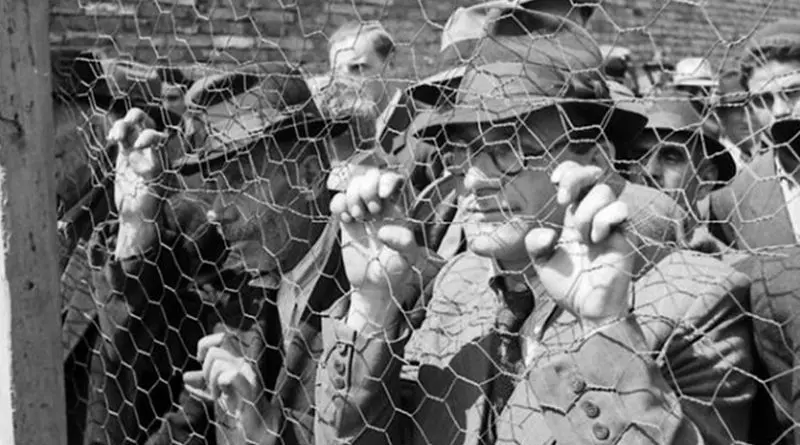Serbia: Holocaust Survivors Recall Escape From Nazis – Analysis
As Serbia marks Holocaust Remembrance Day, two Serbian Jews who survived the Nazi occupation of the country as children told BIRN how they managed to avoid death.
By Vanja Djuric*
Serbian state officials and Holocaust survivors gathered on Saturday to commemorate Holocaust Remembrance Day at the former Staro Sajmiste concentration camp in Belgrade, while two men who are now in their eighties also recalled their memories of the Nazi occupation during WWII.
Eighty-two-year-old Jozef Baruhovic and his friend, retired Belgrade University professor Aleksandar Ajzinberg, were fortunate enough to survive when some 80 per cent of the pre-war Jewish population of Serbia of about 33,000 were wiped out.
Ajzinberg’s father was one of them. He was killed in a gas wagon at Staro Sajmiste, a former trade fair complex that was transformed into the largest concentration camp in south-east Europe, known as Judenlager Semlin.
Ajzinberg only found this out at the end of WWII, when he returned to Belgrade with Russian troops when it was liberated from the occupation.
At the beginning of the war, his family was living in Belgrade, but after the Nazis moved in, they decided to flee.
“In 1941, on April 6, when Belgrade was bombed, we went to [the municipality of] Sopot, and there the Germans found us and put yellow armbands on our arms [to indicate they were Jews],” he recalled. “So we escaped to some village, close to Belgrade.”
As early as May 1942, the Nazis claimed that Serbia was judenfrei – free of Jews – one of the first nations in Europe to be given this designation.
Ajzinberg’s family acquired false documents and moved to the hills in Homolje in eastern Serbia to seek refuge. On the way there, they were stopped by Chetniks, Serbian nationalist fighters, who assumed they were Germans.
“My mother was so frightened so she passed out and later admitted who we were. She wanted us to be victims and to spare the people in the village who were going to take us in and hide us. The Chetnik then took off his headgear, made a cross with his hands and said, ‘You should thank God for inspiring you to tell the truth,’” he said.
Until the end of WWII, they were hiding in the woods in Homolje. But Ajzinberg’s troubles didn’t stop there, because after the war he was arrested by the Yugoslav intelligence agency, UDBA, on suspicion of collaborating with the Nazis.
“They were wondering how it happened that I, a Jew, survived. I was only a 13, 14-year-old boy and I spent 65 days in prison. I saw terrible things there like people being beaten up,” he said.
Jozef Baruhovic escaped death by hiding out in several cities across the Balkans like Pristina in Kosovo, Sarajevo, Mostar in Bosnia and Herzegovina and Skadar in Albania.
“I was in Sarajevo when the [Nazi-allied] Independent State of Croatia, the NDH, took it over, and the fascist Ustasa movement came. Our next-door neighbour came and told us that it was not the moment for us to live together here, we had to leave,” Baruhovic recalled.
In Socialist Yugoslavia, after WWII, he said that the government made serious efforts to erase the idea of ethnically-divided nations and to build a state based on the slogan of “brotherhood and unity”.
“Only the working class was important, but in the end they failed and nationalism boiled over again,” he said.
The two men were speaking to BIRN in the northern city of Novi Sad, where they were giving a workshop to high-school students to coincide with Serbia’s annual remembrance day for the victims of Holocaust, genocide and other fascist crimes.
“There are never enough meetings with young people,” noted Ajzinberg. Baruhovic agreed that education is crucial for preventing extremism: “People with less formal education can easily believe in propaganda and be seduced by some ideology,” he suggested.
Both men said however that they fear that society has not learned enough from the atrocities committed during WWII, and that there is always the possibility that Nazism could rise again, given the wrong circumstances.
“Remember the ’90s!” said Baruhovic, recalling the Balkan war years. “So we didn’t learn a lesson and there is always the possibility for something like that. It takes only a moment for a good, average man to turn into your enemy.”

